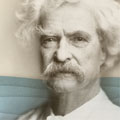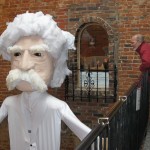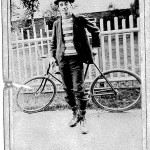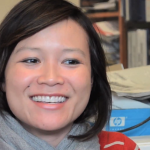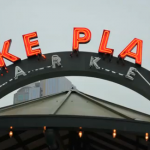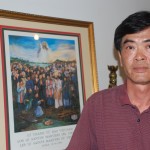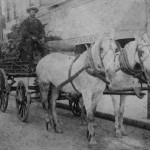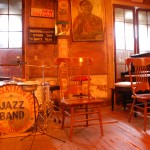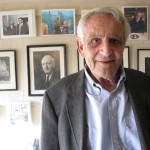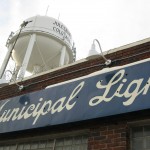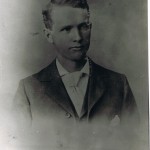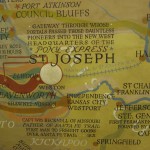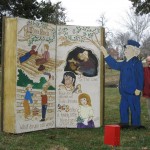For obvious reasons it’s hard to find a homeless city. No address. Hopeville, one of the three largest homeless camps in St. Louis, comes with nothing more than “north of The Arch, next to the river.”
But sure enough, it’s there at the end of Mullanphy Street, between the railroad tracks and the Mississippi River flood wall. Tarps, tents, old rusty vans, fires in trash cans, dozens of cats, and a sign that says “Welcome to Hopeville” are all evidence of the civilization on the fringes of society. That, and the smell, which is a combination of unwashed people and campfire smoke.
The three of us approached the camp, and a man poked his head out of a van and waved. He was friendly, and we all shook hands. Loren explained our project and asked if there was someone the three of us could speak to, as if we were searching for a customer service representative rather than a spokesperson for a homeless camp.
He didn’t hesitate. “Big Mama,” he said.
Sorry, who?
“Big Mama.” He pointed.
Big Mama lumbered over to us. Within seconds it was clear that she was not only Big Mama, as in size 24 big, but big in position. Tedra “Big Mama” Franks was the mayor of Hopeville.
She had just woken up. She said she needed to sit down but, yes, of course she was the one we could talk to. She plopped down on a wooden swing, and pulled me down next to her. I almost didn’t fit, not because of her size, but because of her personality. Loren lugged over a green wing-backed armchair in great condition, fitting for a professor, and Dan settled down on a tree stump.
We had just rearranged Hopeville’s living room, making a conference room underneath a tree. Besides the faint smell when the wind changed, it was one of the more pleasant conference rooms I have ever been in, with its blue sky and warm sun. Freeing, somehow.
Big Mama began to talk, a skill at which she’s particularly adept. She didn’t hem and haw about anything either, despite the unsavory pieces of her past. Yes, she has anger management issues. Yes, she used to carry guns. Yes, she stabbed a man. Yes, she saw a friend shot and killed.
“That just gave me the mentality to trust no fuckin’ body,” she said. “Nobody.”
She’s also flown first class next to a woman in fur and diamonds, she told us, and held a steady job, and has a 6’ 10” basketball-playing son in college.
“I been Big Mama for 28 years. One of my passions other than cooking is doing hair.” She did kids’ hair. She was, quite literally, bigger than their mamas, so she lorded that over the fidgety children.
“I’m the Big Mama, you the Little Mama, so you better sit down and get your hair done,” she would tell them. They listened.
It’s her stunning ability to talk, her frankness in mediating disputes and her communication skills that have turned Big Mama in to the mayor of Hopeville. She’s the mouthpiece, the cook, the liaison, the mediator, the choir leader, the coordinator. The people of Hopeville came to her and said: “Look, we need somebody to speak up for us. You do it,” she remembered. “Because you’re not afraid.”
She talks to the TV cameras. She calls the vet. She lines up counselors. She feeds everyone.
“I’m the glue that sticks it all together,” she said.
Hopeville is at once the beginning and the end of a civilization. Many, though not all, of the people here are drunks or addicts or mentally ill. But a new establishment is rising up, somehow. At the very least there’s a mayor, and Big Mama’s role seems more than honorary.
According to the census, there are 34 permanent residents, meaning they own their tents, Big Mama said. Yes, Hopeville has a census. Seven black people, and the rest are white, she tells us when we ask.
Big Mama arrived in Hopeville a little more than a year ago. She remembers the events with an unnerving precision. On May 12, 2010, she was laid off. Her last paycheck arrived. On May 15, she came to Hopeville.
She’s been mayor for about two months. In her leadership role, she’s a no-nonsense woman. “You ain’t gonna win in a conversation,” Big Mama said. She doles out advice, and it’s not always pleasant. And don’t come to her if you’re not sober. You’ll have to deal with her anger management problem.
“I could be aggressive, especially when it comes to things I can’t tolerate, like sloppy drunks.”
Cooking is one way that Big Mama unwinds. Even the people she doesn’t get along with wonder when she’s going to make her next big meal.
“You ever had fried pizza on the grill?” she asked Dan, who was sitting across from her on his stump. He smiled and shook his head. She shot him a look and paused. Dan was wearing a sweater, diligently taking notes, and looking particularly clean-cut that morning. He looked like he’s never had fried pizza. “You ain’t ready,” she told him, and he nodded eagerly, agreeing.
Members of the outside community used to bring cheeseburgers, chili and pots of spaghetti. Big Mama needed to spice it up, so she started asking for the raw materials instead.
“I’ll find a way to glaze it, caramelize it, and put it on your plate so good, you don’t care what it tastes like.”
The last community meal she made was a bacon cheeseburger meatloaf on the grill, with cabbage, carrots, broccoli and potatoes smothered in a cheese sauce, accompanied by a huge pan of Jiffy cornbread.
Between her and the person she calls “her man,” she gets 400 food stamps a month. Hopeville coolers are filled with baloney, hot dogs and cheese. Big Mama’s cooler is full of rib tips and roasts.
But make no mistake, Hopeville is not a sentimental, fuzzy, welcoming place—one resident was stabbed to death in May. Its residents primarily operate autonomously.
“You look at us as a community. Each individual household has its own issue. You pull together when it’s true or right,” she said.
But Big Mama truly appears to care for the community. “As long as you a Christian, ain’t you supposed to share?”
It’s all about “a plan.” In her case the plan is played out according to a prophetic dream she had while in Baltimore about a homeless civilization, but the plan needs to be just as concrete as it is cosmic. Under Big Mama’s rule, if you don’t have a plan, you need to get one.
“You know what’s right to do: Let’s do it.”
She said she’s been approved for a shelter and care program, and she’ll move into a place around Nov. 15, after she’s able to provide proof of income through unemployment checks. Then she’ll work with a temp agency that will place her in light industry work.
“Now is the time to make up your mind. What are the areas I need to change?” Big Mama said.
Unsurprisingly Hopeville is headed for change as well. Not only does St. Louis want to clear out the homeless camp, but winter is coming. In a homeless city, Mother Nature’s caprice is more than just annoying. When the Mississippi rose over the levee, the camp flooded. “I started rolling like a river raft,” she said. Big Mama’s tent (she calls it her “estates”) started to rise up and float away.
“I don’t believe everybody will be able to be placed in a home, but I believe those that are able [will be]. Go out and handle your business,” she said.
The train rolled by, so close to the camp it looked like it would barrel a couple of tents over. It runs through Hopeville eight times a day.
“We so used to it, it’s nothing,” she said, raising her voice to be heard over the metallic clamor. “It don’t even exist no more.”
Hopeville’s name began as a mockery of what the tent city stood for—people at the end of their ropes, without jobs, without stability, without any kind of permanence in society. But like the noise of the train, Big Mama has grown accustomed, maybe even numb, to the harsh conditions of Hopeville to find a different kind of peace.
“It might have started out as a joke,” Big Mama said, “but I really found hope when I got back down here.”
Alyssa


